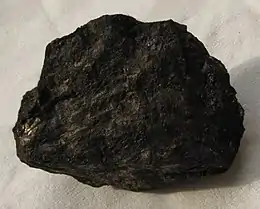Talnakhite
Talnakhite is a mineral of chalcopyrite group with formula: Cu9(Fe, Ni)8S16.[1] It was named after the Talnakh ore deposit, near Norilsk in Western Siberia, Russia where it was discovered as reported in 1963 by I. Budko and E. Kulagov.[2] It was officially named "talnakhite" in 1968.[3][4] Despite the initial announcement it turned out to be not a face centered high-temperature polymorph of chalcopyrite, but to have composition Cu18(Fe, Ni)18S32. At 80 °C (176 °F) to 100 °C (212 °F) it decomposes to tetragonal cubanite plus bornite.[5][6]
| Talnakhite | |
|---|---|
 Talnakhite and putoranite | |
| General | |
| Category | Sulfide mineral |
| Formula (repeating unit) | Cu9(Fe, Ni)8S16 |
| Strunz classification | 2.CB.10b |
| Crystal system | Isometric |
| Crystal class | Hextetrahedral (43m) H-M symbol: (4 3m) |
| Space group | I4 3m |
| Identification | |
| Color | Brass-yellow, tarnishes to pink or brown tints, then iridescent |
| Luster | Metallic |
| Diaphaneity | Opaque |
References
- Talnakhite: Talnakhite mineral information and data
- Ivetta Budko, Eduard Kulagov, "A Natural Cubic Chalcopyrite" (Будько И.А., Кулагов Э.А., "Природный кубический халькопирит"), Докл. АН АН СССР. (1963) vol. 152, no. 2, pp. 408—410.
- Будько И. А., Кулагов Э. А. "Новый минерал талнахит — кубическая разновидность халькопирита", Zapiski Vsesoyuznogo Mineraligicheckogo Obshchestva, 1968. ч. 97, вып. 1, с. 63.
- "Time to gather stones" Archived 2011-10-02 at the Wayback Machine(in Russian)
- Cabri L.J., Econ.Geol.(1967) 62, 910-925
- Michael Fleischner, "New Mineral Names", The American Mineralogist, 1970, vol 55, p. 2135
This article is issued from Wikipedia. The text is licensed under Creative Commons - Attribution - Sharealike. Additional terms may apply for the media files.